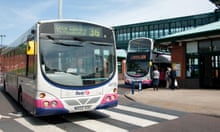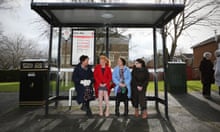Campaigners have called for free bus travel and the reopening of hundreds of miles of railway lines to end reliance on cars, as transport is due to be confirmed as the UK’s largest contributor to greenhouse gases.
Official data released on Tuesday is expected to confirm transport as the most polluting sector, largely driven by cars. It outstripped energy for the first time in 2016, with annual emissions of about 125m tonnes of CO2. This figure has barely changed since 1990.
Friends of the Earth said there needed to be a “radical reimagining of transport” to bring about a 20% reduction in car journeys, even with a faster switch to electric cars, to meet climate change targets.
The group said free bus travel, costing £3bn a year, would also help address public health concerns around air quality and obesity.
Mike Childs, the head of research at Friends of the Earth, said the outlay was a fraction of road spending. He said: “Dozens of cities across the world offer some form of free public transport.
“What we are seeing instead is bus fares rising 75% over the last 15 years and over 3,300 services reduced or removed since 2010 in England and Wales.”
Lynn Sloman, the director of the Transport for Quality of Life consultancy, said: “Our research makes it clear that UK transport policy requires a complete overhaul to enable us to comply with greenhouse gas reduction needs and other pressing public health concerns such as air quality and obesity.”
Labour said it was committed to re-regulation of buses and would provide free bus travel for under-25s, where services were under public control.
A Department for Transport spokeswoman said: “As set out in our Road to Zero strategy, the government’s ambition is for all new cars and vans to be effectively zero emission by 2040. We are investing £1.5bn to make this happen.
“We also support bus travel through £250m every year, as well as a further £1bn for the free bus pass scheme, paving the way to a more sustainable future.”
The DfT has awarded more than £6m to build hundreds of rapid chargepoints across Britain to support ultra-low emission taxis.
Meanwhile, the Campaign for Better Transport has called on the government to reopen dozens of rail lines around Britain to reach the most disconnected and disadvantaged communities.
The group has identified 33 schemes which it said could put 500,000 people back in touch with the rail network. It said that an additional 20m rail passenger journeys a year could be funded by a £4.8bn outlay, which is a fraction of the money already allotted to HS2.
Darren Shirley, the Campaign for Better Transport’s chief executive, said: “The government should invest in a nationally led programme of expansion of the railway to help disadvantaged communities and tackle regional inequalities; reduce carbon emissions and air pollution; and create better and healthier places to live.”
Examples of lines identified as a priority include linking Wisbech, a relatively deprived town in Cambridgeshire, to jobs and training centres; converting a freight-only line in Hampshire serving towns into Southampton; and connecting towns in Northumberland to the Tyne and Wear Metro.
The RMT union backed the call. Its general secretary, Mick Cash, said: “For years politicians have been talking up the benefits of reopening lines but few reach construction due to a lack of a national approach and public investment.”
A DfT spokesperson said: “We have received a wide variety of proposals to enhance the railway from across the public and private sector, and are working with promoters to explore opportunities to reopen routes cut under Beeching.”
In 2017, the government called for proposals to reopen the lines that were closed by the Beeching cuts of the 1960s, as part of a rail strategy announced by the transport secretary, Chris Grayling, although no funding was promised.









